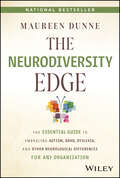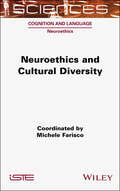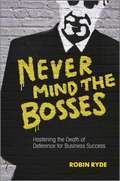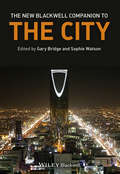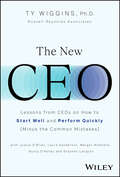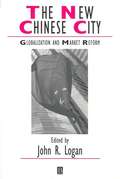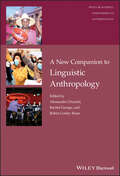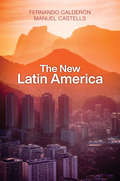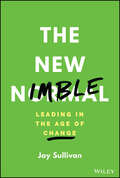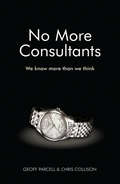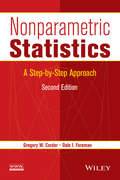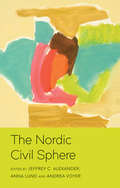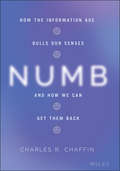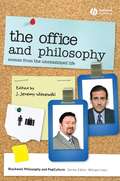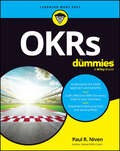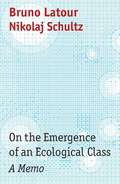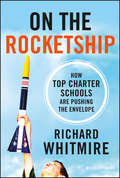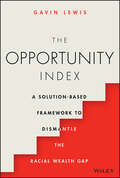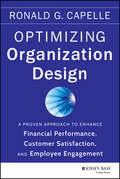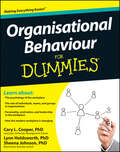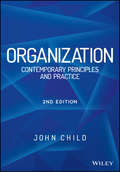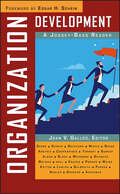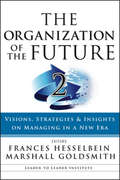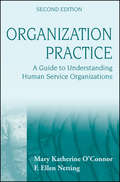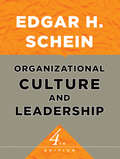- Table View
- List View
The Neurodiversity Edge: The Essential Guide to Embracing Autism, ADHD, Dyslexia, and Other Neurological Differences for Any Organization
by Maureen DunneIn The Neurodiversity Edge, renowned Oxford-trained cognitive scientist, neurodiversity expert, and business leader, Dr. Maureen Dunne presents a pioneering framework to harnessing the power of neurodiversity to navigate the most important human resources revolution in the modern era. Did you know that an estimated 1 in 5 people are “neurodivergent”—have a mind that works differently, such as the autistic, ADHDers, the dyslexic, synesthetes, and other unique neurotypes—and that the vast majority are motivated, capable, and unemployed? This indispensable guide is based on more than two decades of immersive cognitive science research, case studies, stories from neurodivergent voices, in-the-trenches work with hundreds of organizations from start-ups to global Fortune 500 titans, and Dr. Dunne's own lived experiences as a neurodivergent employer, entrepreneur, board member, and CEO. Too many unique minds and perspectives on the sidelines, and too many organizations beset by groupthink, innovation-stagnation, and a lack of access to qualified new candidates. The Neurodiversity Edge takes you all the way from why to what and to how, delivering practical insights that build on a new foundational framework: Cultivate a values-driven approach to building a culture of sustained authentic inclusion where everyone can thrive, How to improve the interview process to avoid missing game-changing talent Develop a hybrid office protocol that works for everyone and a support infrastructure that aligns with universal design principles Discover why Google's Project Aristotle found that innovation and performance hinge on psychological safety Uncover and eliminate the destructive influence of unconscious cognitive biases Take a graphic tour into the wonders of the human mind Understand unique problem-solving abilities such as lateral thinking, visual-spatial thinking, multisensory thinking, leaps of creative insight, hyperfocus, and many more How to articulate and implement organizational goals and measure progress toward them The Neurodiversity Edge is an essential guide for executives, board directors, human resources professionals, managers, recruiters, entrepreneurs, venture capitalists, allies, educators, nonprofit leaders, and anyone with an interest in better understanding neurodiversity, authentic neuroinclusion, and the human mind.
Neuroethics and Cultural Diversity
by Michele FariscoThere is a growing discussion concerning the relationship between neuroethical reflections and cultural diversity, which is among the most impactful factors in shaping neuroethics, both as a scientific discipline and a social enterprise. The impacts of culture on science and its public perception are particularly relevant to neuroethics, which aims to facilitate the creation of an interface between neuroscience and society at large. Time is ripe for neuroethics to review the influence of the culturally specific contexts from which it originated (i.e. North America and Western Europe) and to also include other cultural perspectives in the discussion. This book illustrates a convergent approach among different cultures in identifying the main issues raised by neuroscience and emerging technologies. This should be taken as a starting point for advancing in the search for shared solutions, which are, if not definitive, at least sufficiently reliable to be translated into democratic deliberative processes.
Never Mind the Bosses
by Robin RydeOver the last few decades, power, information and resources have moved from being concentrated in the hands of a few, to being disbursed across many. We need look no further than events on the world stage to see the heat signature of this - from the arrival of Wikileaks, the Arab Spring of 2011 and the Occupy movements, to the social media revolution and flashpoints such as the British Members of Parliament expenses scandal. All are examples of deep change occurring.This book is about what this means for the workplace and for management. The proposition offered here is that our organisations need to catch up, and that the "death of deference" that we are seeing elsewhere in society needs to be accelerated in the workplace.Systems of deference slow down organisational performance. Deference prevents organisations from learning. It stops them from being agile, innovative and ethical. Deference is the enemy of organisational success and it needs to be dismantled so that in its place we can build modern organisations with a new breed of managers and leaders. This book offers a solution to a problem that belongs in the last century, and a game plan for nothing short of a workplace revolution."If deference is dead, this book is about the resurrection of the effective manager in a world where nothing is quite the way it used to be. Powerful and thought-provoking from start to finish." - Jeremy Vine, BBC Presenter and Author"Never Mind the Bosses is a refreshing type of management book, it advocates that deference to authority figures needs to go if we are to have engaged workforces."- Cary L. Cooper, CBE, Distinguished Professor of Organizational Psychology and Health at Lancaster University Management School"An engaging and entertaining romp through the post punk world. By going beyond the boundaries of most business books, Ryde gives us all food for thought about how organisations are, or are not, dealing with a rapidly changing society and workforce."- Jo Owen, bestselling author of 'How to Manage' and 'How to Lead'"If you are looking for a book that will shake up your thinking about how to improve your organization's performance - or worried that your competitors will find it first! - try this one."- Professor Dutch Leonard, Harvard Business School & Harvard University's John F. Kennedy School of Government
The New Blackwell Companion to the City
by Sophie Watson Gary BridgeThis book considers the state of the city and contemporary urbanisation from a range of intellectual and international perspectives. The most interdisciplinary collection of its kindProvides a contemporary update on urban thinking that builds on well established debates in the fieldUses the city to explore economic, social, cultural, environmental and political issues more broadlyIncludes contributions from non Western perspectives and cities
The New CEO: Lessons from CEOs on How to Start Well and Perform Quickly (Minus the Common Mistakes)
by Ty WigginsYour personal guide to navigating the first days, weeks, and months in the top job, based on powerful interviews with today's most successful CEOs. Becoming a CEO is a high-stakes moment, whether it's your first, second, or third time in the seat. What you say and how you act in your early days as CEO sets the tone for how you'll be perceived for years to come. Yet, until now, few CEOs have shared their stories on what worked, what didn't, and what they wish they'd done differently. In The New CEO, Dr. Ty Wiggins, an experienced leadership advisor specializing in CEO transitions, explains how to land well as a new CEO, accelerate your impact, and unlock the most affirming experience of your career. Drawing on compelling storytelling and groundbreaking research of hundreds of CEOs around the world, the book offers a incisive guide on what to say and do as a new CEO, including how to define your priorities, build your team, fast-track critical changes, work with the board, and set (or reset) the organization's culture. You'll also find: Why being a CEO is the toughest (and loneliest) job in business—and what to do about it. How to overcome the “First 100 Days” mindset and pressure for early wins to deliver sustainable, long-term success. How to avoid getting trapped in the “CEO Bubble,” as well as how to navigate (inevitable) challenges, knocks, and missteps. Perfect for newly appointed CEOs—whether it's your first time on the job or your second or third—The New CEO is also an essential resource for anyone seeking insights into the mindset and priorities of CEOs, including board members and directors, in-house counsel, leadership coaches, other executives, and consultants.
The New Chinese City: Globalization and Market Reform (IJURR Studies in Urban and Social Change Book Series #52)
by John R. LoganUrbanisation and urban development issues are the focus of this comprehensive account which introduces readers to the far-reaching changes now taking place in Chinese cities.
A New Companion to Linguistic Anthropology (Wiley Blackwell Companions to Anthropology)
by Alessandro Duranti Robin Conley Riner Rachel GeorgeProvides an expansive view of the full field of linguistic anthropology, featuring an all-new team of contributing authors representing diverse new perspectives A New Companion to Linguistic Anthropology provides a timely and authoritative overview of the field of study that explores how language influences society and culture. Bringing together more than 30 original essays by an interdisciplinary panel of renowned scholars and younger researchers, this comprehensive volume covers a uniquely wide range of both classic and contemporary topics as well as cutting-edge research methods and emerging areas of investigation. Building upon the success of its predecessor, the acclaimed Blackwell Companion to Linguistic Anthropology, this new edition reflects current trends and developments in research and theory. Entirely new chapters discuss topics such as the relationship between language and experiential phenomena, the use of research data to address social justice, racist language and raciolinguistics, postcolonial discourse, and the challenges and opportunities presented by social media, migration, and global neoliberalism. Innovative new research analyzes racialized language in World of Warcraft, the ethics of public health discourse in South Africa, the construction of religious doubt among Orthodox Jewish bloggers, hybrid forms of sociality in videoconferencing, and more. Presents fresh discussions of topics such as American Indian speech communities, creolization, language mixing, language socialization, deaf communities, endangered languages, and language of the law Addresses recent trends in linguistic anthropological research, including visual documentation, ancient scribes, secrecy, language and racialization, global hip hop, justice and health, and language and experience Utilizes ethnographic illustration to explore topics in the field of linguistic anthropology Includes a new introduction written by the editors and an up-to-date bibliography with over 2,000 entries A New Companion to Linguistic Anthropology is a must-have for researchers, scholars, and undergraduate and graduate students in linguistic anthropology, as well as an excellent text for those in related fields such as sociolinguistics, discourse studies, semiotics, sociology of language, communication studies, and language education.
The New Latin America
by Fernando Calderon Manuel CastellsLatin America has experienced a profound transformation in the first two decades of the 21st century: it has been fully incorporated into the global economy, while excluding regions and populations devalued by the logic of capitalism. Technological modernization has gone hand-in-hand with the reshaping of old identities and the emergence of new ones. The transformation of Latin America has been shaped by social movements and political conflicts. The neoliberal model that dominated the first stage of the transformation induced widespread inequality and poverty, and triggered social explosions that led to its own collapse. A new model, neo-developmentalism, emerged from these crises as national populist movements were elected to government in several countries. The more the state intervened in the economy, the more it became vulnerable to corruption, until the rampant criminal economy came to penetrate state institutions. Upper middle classes defending their privileges and citizens indignant because of corruption of the political elites revolted against the new regimes, undermining the model of neo-developmentalism. In the midst of political disaffection and public despair, new social movements, women, youth, indigenous people, workers, peasants, opened up avenues of hope against the background of darkness invading the continent. This book, written by two leading scholars of Latin America, provides a comprehensive and up-do-date account of the new Latin America that is in the process of taking shape today. It will be an indispensable text for students and scholars in Latin American Studies, sociology, politics and media and communication studies, and anyone interested in Latin America today.
The New Nimble: Leading in the Age of Change
by Jay SullivanTransform your organization into an adaptable and flexible innovator In The New Nimble: Leading in the Age of Change, accomplished author, professor, and consultant Jay Sullivan delivers a clear, tangible, and actionable guide to implementing flexibility and creativity in your enterprise. Through interviews with senior leaders from a variety of industries and disciplines, the author shows you the trends and behaviors that allowed successful companies to navigate the constantly changing realities and complexities of the COVID-19 crisis. The book demonstrates how the most adaptable firms internalized and institutionalized lessons from the health emergency and applied those lessons to their everyday operations. You’ll discover: How to go beyond economic, business, and industry trends to make decisions based on immediately relevant—and rapidly changing—demands How to deal with pushback from staff, clients, and the public as you make the changes you need to make in your company Ways to apply the lessons from the COVID-19 crisis to the next unexpected and unpredictable emergencyAn essential and practical handbook for managers, executives, founders, directors, entrepreneurs, and other business leaders doing their best to manage their way through chaotic and volatile environments, The New Nimble is the hands-on leadership guide for a new world that we’ve all been waiting for.
No More Consultants
by Chris Collison Geoff ParcellThis book provides you with the tools to tap into the capabilities that already exist in your organization, but are as yet inaccessible. The book shows you how to make maximum use and accessibility of existing knowledge by implementing a successful tool, The River Diagram. This tool will help reveal your organization's strengths and weaknesses, which will aid you in resolving an internal problem. Illustrated using an exciting range of case studies including BP, Oracle, UNAIDS, and others, this book will guide you towards saving both time and money.
Nonparametric Statistics
by Dale I. Foreman Gregory W. Corder"...a very useful resource for courses in nonparametric statistics in which the emphasis is on applications rather than on theory. It also deserves a place in libraries of all institutions where introductory statistics courses are taught." -CHOICEThis Second Edition presents a practical and understandable approach that enhances and expands the statistical toolset for readers. This book includes:New coverage of the sign test and the Kolmogorov-Smirnov two-sample test in an effort to offer a logical and natural progression to statistical powerSPSS® (Version 21) software and updated screen captures to demonstrate how to perform and recognize the steps in the various proceduresData sets and odd-numbered solutions provided in an appendix, and tables of critical valuesSupplementary material to aid in reader comprehension, which includes: narrated videos and screen animations with step-by-step instructions on how to follow the tests using SPSS; online decision trees to help users determine the needed type of statistical test; and additional solutions not found within the book.
The Nordic Civil Sphere
by Jeffrey C. Alexander Anna Lund Andrea VoyerThe civil sphere is a distinctively democratic field in modern societies, one that sustains universalizing cultural aspirations and organizational structures and that has tense and uncertain boundaries with other spheres of social life, like the economy, religion, family, and state. Unlike the latter, which are more particularistic and hierarchical in character, the civil sphere defines itself in terms of solidarity – the feeling of being connected with every other person in the collectivity. The utopian ideals of democratic solidarity shape every modern society, even if they are often compromised by the messy realities of social life. This volume uses the theory of the civil sphere to shed new light on Nordic societies, while at the same time drawing on the distinctive experiences of the Nordic nations to reflect on and advance the theory of the civil sphere. Nordic societies have long been admired for creating a distinctive form of social democracy, but this admirable achievement has not been well conceptualized theoretically. Most attempts to explain Nordic social democracy focus on material and organizational factors. This volume, by contrast, emphasizes the cultural foundations and characteristics of social democracy, demonstrating how civil sensibilities are necessary for the creation of an egalitarian and democratic state. Nordic civil spheres, however, are not only pro-civil but also white in color, European in ethnicity, secular in character and gender-equal in a subtly restrictive manner. Such primordialization of state civility is vividly on display in the sometime tense relationships that develop among natives and “foreigners” in Nordic countries, relationships that expose the primordial undersides of the social democratic codes and civil values that constitute the Nordic civil sphere. A major contribution to the theory of the civil sphere and to our understanding of the cultural and normative underpinnings of social and political life, this volume will be of particular interest to students and scholars of sociology and politics.
Numb: How the Information Age Dulls Our Senses and How We Can Get them Back
by Charles R. ChaffinDiscover how to manage this noisy world without it managing you. In Numb, distinguished author Dr. Charles R. Chaffin delivers a fun and evidence-based exploration of how you can devote more attention on what you believe is important while ignoring the distractions that increasingly permeate your life. Using research from cognitive, education, positive, and clinical psychology, the book identifies the sources of noise and distraction in this information age and how we can manage it in all aspects of our lives. You'll learn about: How experiences in technology, from social media to selfies to porn, impact our ability to engage and connect with others The news we consume and the impact of confirmation bias, filter bubbles, and tribalism How FOMO and choice overload impact our decision-making The power of our attention in all aspects of our daily lives Perfect for anyone interested in the expanding impact of the information age on our collective psyche, ;Numb helps empower you to use technology and information not as a destination, but as a tool towards authenticity and empowerment.
The Office and Philosophy
by J. Jeremy WisnewskiJust when you thought paper couldn't be more exciting, this book comes your way! This book--jammed full of paper--unites philosophy with one of the best shows ever: The Office. Addressing both the current American incarnation and the original British version, The Office and Philosophy brings these two wonders of civilization together for a frolic through the mundane yet curiously edifying worlds of Scranton's Dunder-Mifflin and Slough's Wernham-Hogg.Is Michael Scott in denial about death? Are Pam and Jim ever going to figure things out? Is David Brent an essentialist? Surprisingly, The Office can teach us about the mind, Aristotle, and humiliation. Even more surprisingly, paper companies can allow us to better understand business ethics. Don't believe it? Open this book, and behold its beautiful paper...Join the philosophical fray as we explore the abstract world of philosophy through concrete scenes of the unexamined life in The Office. You may discover that Gareth Keenan is secretly a brilliant logician, that Dwight Schrute is better off deceiving himself, that David Brent is an example of hyperreality, and that Michael Scott is hopelessly lost (but you probably already knew that!).
OKRs For Dummies
by Paul R. NivenYour one-stop guide to implement Objectives and Key Results (OKRs) effectively In business, OKRs—that’s short for Objectives and Key Results—are the gold standard for communicating and delivering on what you want to accomplish and how you’ll get there. OKRs For Dummies provides you with step-by-step guidance for following in the footsteps of some of the world’s leading organizations. Drive focus on what matters most, align and engage teams, and generally maximize the benefits OKRs have to offer, thanks to this easy-to-use guide. You’ll learn how to roll out an OKR system that closes the gap between strategy and execution, and helps people at every level organize their daily decisions around shared and important goals. It’s time to get strategic with OKRs. Understand the OKR methodology and determine the benefits for your organization Learn how to craft sound OKRs for every level and department of your business Discover best practices and common pitfalls to ensure success when applying OKRs Focus on the three aspects of the OKRs process: Adoption, Engagement, and AlignmentBusiness owners, team leaders, C-suite executives, and coaches will love this friendly how-to manual for joining the OKR movement.
On the Emergence of an Ecological Class: A Memo
by Nikolaj Schultz Bruno LatourUnder what conditions could ecology, instead of being one cluster of movements among others, organise politics around an agenda and a set of beliefs? Can ecology aspire to define the political horizon in the way that liberalism, socialism, conservatism and other political ideologies have done at various times and places? What can ecology learn from history about how new political movements emerge, and how they win the struggle for ideas long before they translate their ideas into parties and elections? In this short text, consisting of seventy-six talking points, Bruno Latour and Nikolaj Schultz argue that if the ecological movement is to gain ideological consistency and autonomy it must offer a political narrative that recognises, embraces and effectively represents its project in terms of social conflict. Political ecology must accept that it brings along division. It must provide a convincing cartography of the conflicts it generates and, based on this, it must try to define a common horizon of collective action. In order to represent and describe these conflicts, Latour and Schultz propose to reuse the old notions of &‘class&’ and &‘class struggle&’, albeit infused with a new meaning in line with the ecological concerns of our New Climate Regime. Advancing the idea of a new ecological class, assembled by its collective interests in fighting the logic of production and safeguarding our planet&’s conditions of habitability, they ask: how can a proud and self-aware ecological class emerge and take effective action to shape our collective future?
On the Rocketship
by Richard WhitmireThe face of American education is evolving--and the roadmap is clearOn the Rocketship: How Top Charter Schools are Pushing the Envelope examines the rise and expansion of leading charter school network Rocketship, revealing the "secret sauce" that makes a successful program. A strong narrative with a timely message, the book explores how Rocketship started and the difficulties encountered as it expands. Designing schools for children who have been failed by traditional schools is extremely challenging work. Setbacks are inevitable. Later in the book the narrative shifts to the national picture, exploring how high performing charter schools are changing the education landscape in cities such as Denver, Memphis, and Houston. The book emerges just as charter schools are running into stiff political opposition in New York City and elsewhere. Even in San Jose, Rocketship's home base, the pushback against charter schools is gaining speed. On the Rocketship becomes a valuable resource for explaining what's at stake in this battle. Lose these schools, in New York, San Jose and other cities, and low-income and minority students lose their best shot at a quality education.Written by a veteran journalist who followed Rocketship through a school year, the book explores some of the factors that make Rocketship and other charters successful, including the blended learning that was pioneered at charter schools, especially Rocketship.Many schools around the country are looking to Rocketship as a model for implementing blended learning. The interplay between charter schools and blended learning is setting a change in motion, and the American education system is ready to evolve. On the Rocketship details this phenomenon, providing insights for educators across the nation.
The Opportunity Index: A Solution-Based Framework to Dismantle the Racial Wealth Gap
by Gavin LewisA bold and fresh perspective unravelling the economics of racial inequality In The Opportunity Index, BlackRock Managing Director and co-founder of the #Talkaboutblack movement, Gavin Lewis, skillfully plots the origins of the racial wealth gap and its impact on the inequalities faced by the Black community today. Weaving a personal and at times moving narrative through some of the most disruptive events of our time, he offers a blueprint for businesses and individuals to understand the risks and opportunities presented by inequality and issues an urgent call to action. The Opportunity Index also presents: A root cause-oriented and solutions-focused exploration of the racial wealth gap and its role in social, health, and opportunity inequality A perspective that moves beyond the typical workplace discussion to explore the deeper truths about society and the role of capitalism The lessons learned from the #BlackLivesMatter, #MeToo, and climate change movements and how these provide case studies for real and lasting changeAn eye-opening and insightful treatment of what equity and access mean in the context of international finance, The Opportunity Index will earn a place in the libraries of finance professionals, business leaders, teachers, academics, community leaders, diversity, equity, and inclusion experts, and anyone else with an interest in racial, social, and economic fairness around the world.
Optimizing Organization Design
by Ronald G. CapelleOptimizing Organization Design offers a comprehensive resource and valued guide for anyone interested in improving organization performance. The book presents an approach to optimizing organization design that is based on over 100 large scale projects and 23 research studies that have been completed by Capelle Associates over the past 25 years. In addition, the book includes insightful comments from executives on their success in using this approach. Capelle's research and client experience reveal that optimizing organization design leads to better financial performance, customer satisfaction and employee engagement. It can provide a competitive advantage and a significant return on investment. It can also become the foundation of both strategy implementation and human resources management.Capelle shows that organization design includes the alignment of a number of critical factors, including positions (vertical and functional); accountabilities and authorities (managerial and cross functional); people; deliverables and tasks. He shows that manager - direct report alignment is the single most important organization design variable. His research also shows that it is suboptimal nearly half the time. This is a horrendous waste of talent and capability, but also provides a significant opportunity for improvement in organization performance. Optimizing Organization Design clearly explains how to implement organization design improvements. This approach includes people change management, project management, and a cascading, iterative approach that is based on teams and involves education, doing real work and feedback. In addition, Optimizing Organization Design includes special sections on the role of the Board of Directors, project management, process management and compensation. In addition, the author has included four case studies and a useful glossary.
Organisational Behaviour For Dummies
by Cary L. Cooper Lynn Holdsworth Sheena JohnsonYour plain-English introduction to organisational behaviourOrganisational Behaviour (OB) is the study of how people, individuals, and groups act in organisations. Whether you're studying OB, or you just want a better understanding of people at work, Organisational Behaviour For Dummies gives you all the essentials for understanding this fascinating subject.Inside you'll find out about personality and individual differences, teams and groups, personnel selection and assessment, and health and well-being at work. You'll also find out how leaders lead, how motivators motivate, and how the modern workplace is changing and evolving.An easy-to-read introduction to organisational behaviour for business, management, and organisational psychology studentsA useful reference for managersA fascinating look at behaviour in the modern workplaceWhether you're a student of organisational behaviour, a manager, or a lifelong learner with an interest in human behaviour and psychology in the workplace, Organisational Behaviour For Dummies has you covered.
Organization
by John ChildThe definitive organization management text for executives andaspiring business leaders Organization: Contemporary Principles and Practices, SecondEdition is the completely updated and revised landmark guide to"macro" organization theory and design, fully grounded in currentinternational practice. International management expert John Childexplores the conditions facilitating the development of neworganizational forms and provides up-to-date coverage of the keydevelopments driving new organization structure and practice. Thisrevised Second Edition includes a new introductory section onOrganization Theory as well as a complete Instructor Manual updatedwith new material on the basic principles of organizationaldesign.With detailed case studies and examples from throughout the UK,Europe, Asia and North America, Organization provides atruly international overview for advanced students and businessexecutives who want to be at the forefront of the evolution inOrganization Theory. 21st Century organizations will befaced with entirely new challenges and opportunities than thosefaced by previous generations, and emerging business leaders mustunderstand the new "macro" realities in order to succeed.Organization will help readers:Understand the "macro" organization, which is distinct fromorganizational behaviourExplore the way organizations fit into the internationalbusiness environment and global economyAnalyze the way organizational structure and design affectmanagement performanceApply advanced organization theory and principles to day to daymanagement activitiesWritten by one of the foremost scholars, the fully updatedSecond Edition of this successful text provides executives andadvanced business students with a wide-ranging and trustworthyguide to organizations as the conditions for their survival in ourglobal business environment change.
Organization Development: A Jossey-Bass Reader
by Edgar H. Schein Joan V. GallosThis is the third book in the Jossey-Bass Reader series, Organization Development: A Jossey-Bass Reader. This collection will introduce the key thinkers and contributors in organization development including Ed Lawler, Peter Senge, Chris Argyris, Richard Hackman, Jay Galbraith, Cooperrider, Rosabeth Moss Kanter, Bolman & Deal, Kouzes & Posner, and Ed Schein, among others. "Without reservations I recommend this volume to those students of organizational behavior who want an encyclopedia of OD to gain a perspective on the past, present, and future...." Jonathan D. Springer of the American Psychological Association.
The Organization of the Future 2: Visions, Strategies, and Insights on Managing in a New Era
by Frances Hesselbein Marshall GoldsmithWith 26 inspiring chapters, this book celebrates the wisdom of some of the most recognized thought leaders of our day: emerging and established experts who share their unique vision of what the organization of the future should look like and must do to survive in the turbulent 21st Century. <P><P> Outsmart Your Rivals by Seeing What Others Don't, Jim Champy Organization Is Not Structure but Capability, Dave Ulrich & Norm Smallwood The Leader's Mandate: Create a Shared Sense of Destiny, James M. Kouzes & Barry Z. Posner A Different Kind of Company, Srikumar S. Rao Free to Choose: How American Managers Can Create Globally Competitive Workplaces, James O'Toole Managing the Whole Mandate for the Twenty-First Century: Ditching the Quick-Fix Approach to Management, Paul Borawski & Maryann Brennan The Values That Build a Strong Organization, Thomas J. Moran Revisiting the Concept of the Corporation, Charles Handy Mobilizing Emotions for Performance: Making the Most of the Informal Organization, Jon R. Katzenbach & Zia Khan Beyond Retirement: Mature Workers Are Essential Talent for Organizations of the Future, Richard J. Leider The Best Hope for Organizations of the Future: A Functioning Society, Ira A. Jackson Reframing Ethics, Spirit, and Soul, Lee G. Bolman &Terrence E. Deal Environment Drives Behavior and Expectations, Bill Strickland with Regina Cronin Dynamic Organizations for an Entrepreneurial Age, Christopher Gergen & Gregg Vanourek Multidimensional, Multinational Organizations of the Future, Jay R. Galbraith Designing Organizations That Are Built to Change, Edward E. Lawler III & Christopher G. Worley Refounding a Movement: Preparing a One-Hundred- Year-Old Organization for the Future, Kathy Cloninger Three Challenges Facing Nonprofits of the Future: People, Funding, and Strategy, Roxanne Spillett Pioneering the College of the Future: Building as We Walk, Darlyne Bailey The Organization of the Future Will Foster an Inclusive Environment, Lee Cockerell The Leader as Subculture Manager, Edgar H. Schein The New High-Performance, Horizontal Organization, Howard M. Guttman The Leadership Blueprint to Achieve Exponential Growth, David G. Thomson Leadership Judgment: The Essence of a Good Leader, Noel M. Tichy & Christopher DeRose The Leader of the Future, William A. Cohen Leadership by Perpetual Practice, Debbe Kennedy
Organization Practice
by Netting F. Ellen O'Connor Mary KatherineHuman service organizations are under increasing pressure to demonstrate that their programs work. Organization Practice, Second Edition helps students and professionals in human services and nonprofit management understand complex behaviors in organizations. This new edition provides a new, practical model for understanding cultural identities within organizations. Also, it is significantly revised to include numerous real-world cases, critical thinking questions, empirical support, and engaging exercises. Social workers, as well as public health and nonprofit administrators will benefit from the insights in this book.
Organizational Culture and Leadership
by Schein Edgar H.Regarded as one of the most influential management books of all time, this fourth edition of Leadership and Organizational Culture transforms the abstract concept of culture into a tool that can be used to better shape the dynamics of organization and change. This updated edition focuses on today's business realities. Edgar Schein draws on a wide range of contemporary research to redefine culture and demonstrate the crucial role leaders play in successfully applying the principles of culture to achieve their organizational goals.
